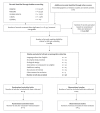Herd effect from influenza vaccination in non-healthcare settings: a systematic review of randomised controlled trials and observational studies
- PMID: 27784531
- PMCID: PMC5291154
- DOI: 10.2807/1560-7917.ES.2016.21.42.30378
Herd effect from influenza vaccination in non-healthcare settings: a systematic review of randomised controlled trials and observational studies
Abstract
Influenza vaccination programmes are assumed to have a herd effect and protect contacts of vaccinated persons from influenza virus infection. We searched MEDLINE, EMBASE, the Cumulative Index to Nursing and Allied Health Literature (CINAHL), Global Health and the Cochrane Central Register of Controlled Trials (CENTRAL) from inception to March 2014 for studies assessing the protective effect of influenza vaccination vs no vaccination on influenza virus infections in contacts. We calculated odds ratios (ORs) and 95% confidence intervals (CIs) using a random-effects model. Of 43,082 screened articles, nine randomised controlled trials (RCTs) and four observational studies were eligible. Among the RCTs, no statistically significant herd effect on the occurrence of influenza in contacts could be found (OR: 0.62; 95% CI: 0.34-1.12). The one RCT conducted in a community setting, however, showed a significant effect (OR: 0.39; 95% CI: 0.26-0.57), as did the observational studies (OR: 0.57; 95% CI: 0.43-0.77). We found only a few studies that quantified the herd effect of vaccination, all studies except one were conducted in children, and the overall evidence was graded as low. The evidence is too limited to conclude in what setting(s) a herd effect may or may not be achieved.
Keywords: herd effect; indirect effect; influenza; systematic review; vaccine-preventable diseases; vaccines and immunisation.
This article is copyright of The Authors, 2016.
Conflict of interest statement
SPK received travel grants from Pfizer and Novartis. DT received grant funding from GSK Canada. SAF, PL, JS, SAA, MS, JN, JJ, JRO, DM, ML: none declared.
Figures



Similar articles
-
Influenza vaccines in immunosuppressed adults with cancer.Cochrane Database Syst Rev. 2013 Oct 29;2013(10):CD008983. doi: 10.1002/14651858.CD008983.pub2. Cochrane Database Syst Rev. 2013. Update in: Cochrane Database Syst Rev. 2018 Feb 01;2:CD008983. doi: 10.1002/14651858.CD008983.pub3 PMID: 24166741 Free PMC article. Updated. Review.
-
Influenza vaccination for healthcare workers who work with the elderly.Cochrane Database Syst Rev. 2006 Jul 19;(3):CD005187. doi: 10.1002/14651858.CD005187.pub2. Cochrane Database Syst Rev. 2006. Update in: Cochrane Database Syst Rev. 2010 Feb 17;(2):CD005187. doi: 10.1002/14651858.CD005187.pub3 PMID: 16856082 Updated. Review.
-
The effectiveness of influenza vaccination in pregnancy in relation to child health outcomes: Systematic review and meta-analysis.Vaccine. 2020 Feb 11;38(7):1601-1613. doi: 10.1016/j.vaccine.2019.12.056. Epub 2020 Jan 10. Vaccine. 2020. PMID: 31932138
-
Does consecutive influenza vaccination reduce protection against influenza: A systematic review and meta-analysis.Vaccine. 2018 Jun 7;36(24):3434-3444. doi: 10.1016/j.vaccine.2018.04.049. Epub 2018 May 1. Vaccine. 2018. PMID: 29724509 Review.
-
Influenza vaccine for patients with chronic obstructive pulmonary disease.Cochrane Database Syst Rev. 2006 Jan 25;(1):CD002733. doi: 10.1002/14651858.CD002733.pub2. Cochrane Database Syst Rev. 2006. Update in: Cochrane Database Syst Rev. 2018 Jun 26;6:CD002733. doi: 10.1002/14651858.CD002733.pub3 PMID: 16437444 Updated. Review.
Cited by
-
Influenza.Lancet. 2022 Aug 27;400(10353):693-706. doi: 10.1016/S0140-6736(22)00982-5. Lancet. 2022. PMID: 36030813 Free PMC article. Review.
-
Seasonal influenza vaccination in Kenya: an economic evaluation using dynamic transmission modelling.BMC Med. 2020 Aug 20;18(1):223. doi: 10.1186/s12916-020-01687-7. BMC Med. 2020. PMID: 32814581 Free PMC article.
-
Cost-Effectiveness of the Use of Adjuvanted Quadrivalent Seasonal Influenza Vaccine in Older Adults in Ireland.Vaccines (Basel). 2023 May 3;11(5):933. doi: 10.3390/vaccines11050933. Vaccines (Basel). 2023. PMID: 37243037 Free PMC article.
-
[Health Technology Assessment (HTA) of the introduction of influenza vaccination for Italian children with Fluenz Tetra®].J Prev Med Hyg. 2021 Sep 10;62(2 Suppl 1):E1-E118. doi: 10.15167/2421-4248/jpmh2021.62.2s1. eCollection 2021 Jun. J Prev Med Hyg. 2021. PMID: 34909481 Free PMC article. Italian. No abstract available.
-
Effectiveness of Influenza Vaccines in the HIVE Household Cohort Over 8 Years: Is There Evidence of Indirect Protection?Clin Infect Dis. 2021 Oct 5;73(7):1248-1256. doi: 10.1093/cid/ciab395. Clin Infect Dis. 2021. PMID: 33949666 Free PMC article.
References
-
- Lozano R, Naghavi M, Foreman K, Lim S, Shibuya K, Aboyans V, et al. Global and regional mortality from 235 causes of death for 20 age groups in 1990 and 2010: a systematic analysis for the Global Burden of Disease Study 2010. Lancet. 2012;380(9859):2095-128. 10.1016/S0140-6736(12)61728-0 - DOI - PMC - PubMed
-
- Centers for Disease Control and Prevention (CDC). People at High Risk of Developing Flu-Related Complications. Atlanta, GA: CDC. [Accessed 21 Oct 2015]. Available from: http://www.cdc.gov/flu/index.htm
-
- Fiore AE, Uyeki TM, Broder K, Finelli L, Euler GL, Singleton JA, et al. Centers for Disease Control and Prevention (CDC) . Prevention and control of influenza with vaccines: recommendations of the Advisory Committee on Immunization Practices (ACIP), 2010. MMWR Recomm Rep. 2010;59(RR-8):1-62. - PubMed
Publication types
MeSH terms
Substances
Grants and funding
LinkOut - more resources
Full Text Sources
Other Literature Sources
Medical

